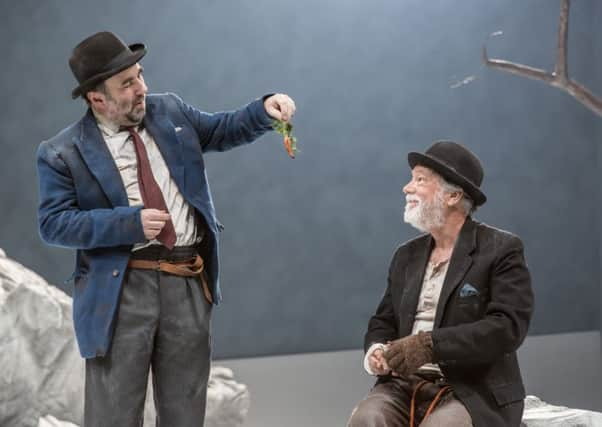Sheffield Theatres takes on the theatrical masterpiece Waiting For Godot


“Epic”, “masterpiece”, “genius” – playing hyperbole bingo when talking about Waiting for Godot is a piece of cake. The hyperbole is also entirely justified. There are no two ways about it – Samuel Beckett’s epic masterpiece is a slice of theatrical genius.
For director Charlotte Gwinner, who has previously directed the works of Sarah Kane and Michael Frayn at Sheffield, it was also a technical challenge.
Advertisement
Hide AdAdvertisement
Hide Ad“It’s like going into a factory and taking on a piece of complex engineering,” she says. “The play is about activity and people trying to counteract waiting and the experience of spending your time waiting, with activity. It’s all about these men trying to keep themselves from thinking about the adversity they feel – and they do that by engineering different games and routines and anything to distract them from the pain they feel at having to simply wait.”
Beckett’s 1955 English version of his play En attendant Godot, staged in Paris in 1953, tells the story of two tramps, in an unnamed location, waiting for Godot. The plight of Estragon and Vladimir, staged for its English premiere by a young Peter Hall, confounded the audience. Not just the audience: it confounded director Sir Peter Hall, who told me in a Yorkshire Post interview in 2008: “I have this occasional nightmare where I choose not to stage Godot. When I read the play I didn’t think it was a turning point in mid-20th century drama. All I really thought was that here was something entirely original.”
However, when theatre critics Kenneth Tynan and Harold Hobson, praised it in their Sunday newspaper columns, the play became the hottest ticket in town. It is already proving equally successful in Sheffield. Gwinner says: “I think it is a play about the simplicity of life and the simple acts we have to carry out to keep ourselves busy and entertained to stop ourselves from considering our mortality. When you dissect the play, you realise it is a series of acts the actors have to go through – putting on their boots, taking off their boots, deciding whether they should stand up or sit down. Eventually you realise that Beckett uses all of these acts to distill the essence of life and he does it with great wit and humanity. Beckett is one of the great comedians, but the comedy doesn’t exist line to line – it exists in the farcical and eccentric and the way these two men perform the same acts over and over again. At times it’s like watching Laurel and Hardy.”
As well as being one of the turning points of British theatre in the last century, Waiting for Godot is also a play that continues to surprise and occasionally dumbfound audiences. As one critic put it, it is after all, a play in which nothing happens – twice. Gwinner says: “Having worked at Sheffield a few times now, I can see that there is an appetite for Beckett. Krapp’s Last Tape and Happy Days were both successful in the studio. When Daniel [Evans, artistic director] suggested putting Godot on the mainstage I thought it was a really interesting choice – something that would challenge the audience, but it felt like it was a challenge they were definitely ready to take on.”
Sheffield Crucible, to February 27. 0114 2496000.